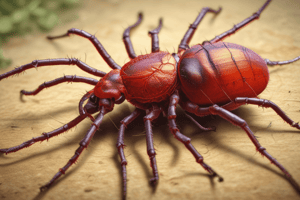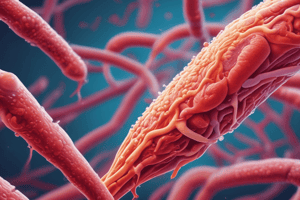Podcast
Questions and Answers
What is the incubation period of B. recurrentis?
What is the incubation period of B. recurrentis?
- 1 to 5 days
- 5 to 20 days
- 10 to 30 days
- 2 to 15 days (correct)
What happens to the febrile period in B. recurrentis infection?
What happens to the febrile period in B. recurrentis infection?
- It worsens as the immune response clears the bacteria from circulation
- It lasts throughout the course of infection
- It remains constant throughout the infection
- It ends abruptly with the development of an adequate immune system (correct)
What is the characteristic of spirochetemia in B. recurrentis infection?
What is the characteristic of spirochetemia in B. recurrentis infection?
- It is absent in the initial stage of infection
- It develops gradually throughout the course of infection
- It remains low throughout the course of infection
- It develops suddenly and remains high throughout the course of infection (correct)
What happens to the disease after the initial infection in B. recurrentis?
What happens to the disease after the initial infection in B. recurrentis?
What is the relationship between the febrile periods and the spirochetemia in B. recurrentis infection?
What is the relationship between the febrile periods and the spirochetemia in B. recurrentis infection?
What is the primary mode of transmission for tickborne relapsing fever?
What is the primary mode of transmission for tickborne relapsing fever?
What is the purpose of using brightfield microscopy in the microscopic examination of B. recurrentis?
What is the purpose of using brightfield microscopy in the microscopic examination of B. recurrentis?
Why is serology difficult and impractical for diagnosing B. recurrentis infection?
Why is serology difficult and impractical for diagnosing B. recurrentis infection?
What is the primary concern when treating B. recurrentis infection with tetracyclines?
What is the primary concern when treating B. recurrentis infection with tetracyclines?
What is the only reservoir of B. recurrentis?
What is the only reservoir of B. recurrentis?
Study Notes
Borrelia Recurrentis Clinical Manifestations
- Causes relapsing fever with an incubation period of 2 to 15 days.
- Massive spirochetemia develops and remains high throughout the course of infection.
- Sudden symptoms appear, including:
- High temperature
- Rigors
- Severe headache
- Muscle pain
- Weakness
- Febrile period lasts about 3 to 7 days and ends abruptly with the development of an adequate immune response.
- Disease recurs several days to weeks later, following a less severe but similar course.
- Febrile periods worsen during spirochetemia and wane as the immune response clears the bacteria from circulation.
Questions Based on the Text
- What is the incubation period of Borrelia recurrentis infection?
- What is the duration of the febrile period in Borrelia recurrentis infection?
- What are the sudden symptoms that appear in Borrelia recurrentis infection?
- What happens to the febrile periods as the immune response clears the bacteria from circulation?
B.recurrentis and Similar Organisms Epidemiology
- Two varieties of relapsing fever exist: tickborne (endemic relapsing fever) and louseborne (epidemic relapsing fever)
- Tickborne relapsing fever is transmitted by the bite of soft ticks of the genus Ornithodoros
- Louseborne relapsing fever is transmitted by crushed and scratched into the skin of the body louse, Pediculus humanus
- Humans are the only reservoir for relapsing fever
- Best prevention and control measure is to control exposure to the arthropod vectors
Microscopic Examination and Culture
- Microscopic examination involves direct examination of spirochetes in blood using thick and thin films of Giemsa or Wright-stained smears
- Brightfield microscopy is used to visualize spirochetes, which are commonly seen among the red cells present
- Culture can be done using Kelly medium, and animal inoculation is rarely used
- Serology is difficult and impractical for diagnosis
Treatment
- Tetracyclines are the drugs of choice for treating relapsing fever
- Death of spirochetes can cause sudden endotoxin release, leading to Jarisch-Herxheimer reaction
- Symptoms of Jarisch-Herxheimer reaction include fever, chills, headache, and myalgia
B.burgdorferi sensu lato Virulence Factors
- Bacterial spread occurs through binding of plasminogen and urokinase-type plasminogen activator to its surface
- This binding can act as a protease to promote tissue invasion
- Complement evasion occurs through binding of factor H
- Organisms can stimulate proinflammatory cytokines, including necrosis factor and interferons
B.burgdorferi sensu lato Clinical Manifestations—Stage 1
- Lyme disease is complex and consists of three stages: early infection (two stages) and late infection (one stage)
- Stage 1 of Lyme disease is characterized by early infection, which includes erythema migrans (EM) in about 60% of patients
- EM is a classic skin lesion that appears as a red macule at the site of the tick bite, expanding to form a larger annular erythema with a target appearance
Studying That Suits You
Use AI to generate personalized quizzes and flashcards to suit your learning preferences.
Description
This quiz covers the clinical manifestations of Borreliae recurrentis, including symptoms, incubation period, and course of infection. Learn about relapsing fever, spirochetemia, and immune response.




